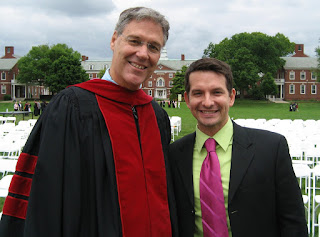
In the self-promoting twitterverse we find ourselves living in today, it's hard to find worthy heroes behind the deafening shouts of, "look at me," "look what I can do," or "my poop is gold," so forth & so on. If you're like me, some of the heroes you did have got their capes blown off by the gusts from their flailing arms, swinging the hammer away as they build up their own pedestal. Or they put on their kryptonite façade to move up from the "D List" to the "C List" of celebrity in whatever particular group's attention they're fishing for.
Of course, I have to be careful. Many folks use twitter for fun, for redeemable purposes, or just use it wise & balanced & enjoy it without sinning. One of my favorite things in the world to do is encourage others. In my spare time I'm always writing someone who's on my heart, who's invested in me, loved me, someone the Lord reminds me is hurting or I just haven't told in a while how grateful I am for them. Perhaps that could be easily seen as brown-nosing or fanny-kissing in the same way that I can misinterpret the hearts of others who live such public lives in the iWorld.
But since we live in a public world of tell-all, I want to tell a story of a hero of mine, because, if intimate things like date-nights with wives are to be broadcast to the world, then consider this some public push-back to brag on someone & give honor to someone who would never toot their own horn.
I just concluded posting a series on missions from a lecture called "
Jesus is the Message of Missions" by George Martin. I had Dr. Martin for 5 classes while a student at
SBTS, far more than I had with any other professor. That was no mistake. If for every class I had under Dr. Martin I had to describe a characteristic of his, I would say:
1) His deep love for Jesus
2) His enviable & contagious joy
3) His love for his family
4) His love for missions (& Southeast Asia)
5) His selflessness & kindness that made everyone around him believe they were his best friend
I came to SBTS equating seriousness & studiousness with holiness. Therefore, my goal was to uphold the law & get good enough grades so that I could get to heaven. I'm exaggerating a bit, but maybe it was because my beloved pastor who led me to the Lord had been pushed out of my home church for teaching the Bible in addition to the fact that I was a new recruit in Calvinazism. Maybe it was because I felt I had to be the next Adoniram Judson or Hudson Taylor if I was going to be a missionary in the future. Whatever it was, it took a bunch of goof balls in Auburn & some hands on experience on the mission field & a lot of learning how ugly ministry is while working at a local church to knock me off my high horse & to help me understand that loving the Triune God & loving people, not defending a system & being it's megaphone
(Calvinism - which I still believe, but that would be another post), is what glorifies God & brings me joy.
But long before I came to this realization, Dr. Martin lived it out before me. Very committed to the doctrines of grace
(again, Calvinism) & God's sovereignty in all things, all you ever got from Dr. Martin was his love for Jesus. I'll never forget fighting tears
(I mean literally not being able to see because my eyes were full of water until I "blinked," not cried, them out) when he painted the most mercy-filled, grace-filled, love brushed image of the Gospel of Jesus from the OT book of Hosea. I'll never forget the genuine prayers that started each class full mainly of thanksgiving & praise from a heart full of gratitude for a Savior who died for him. This list could go on & on, but for the sake of brevity...
Not only was I in 5 of Martin's classes, but we went to the same church, traveled to Southeast Asia together, & he was my mentor in the mentor-groups on campus. When I transferred to an Alabama extension center, he continued to come there to teach. Here I got to watch my 9 other co-horts meet & get to know him & see the way they all felt connected to him & comfortable with him, like he was their long lost friend. Other pastors & secretaries in the front of our church
(where we met for class) loved the days when Dr. Martin came by. I bet he didn't know half their names because they were never formally introduced, but everyone felt loved & befriended when he was around. When we came
(our extension cohort) to Louisville for classes, we always got to crash at Dr. Martin's pad & you felt like a nephew for the week. I know that while some of it is natural personality, the man really is dead to self & alive in Christ & that joy he has from initimacy with Jesus spills out blessings on all those around him. I wish I loved life & Jesus like he does.
Watching him at church & at the house with his family was an example to me before I ever had Luke. You could see from his illustrations & stories about his family in class that he treasured them. He interacted with his children & wife in a genuine way & they responded in such genuine love for him that you knew it couldn't be an act. He has 2 daughters & a son, & while his son was an older teenager I remember seeing Dr. Martin from a distance still being affectionate with him. He cherishes his family as a gift.
Finally, the man has a passion for missions that's unmatched. I came to SBTS ready to be a missionary to Southeast Asia. Before coming to SBTS, Dr. Martin was a missionary in a Muslim country. There's a joke on campus that "God loves you & Dr. Martin has a wonderful plan for you life - to be a missionary!" My initial reason for taking his intro to missions class was because I knew he had lived & labored in what I thought would be my future home. After a major disaster in '04, SBTS took a small team of 3 professors & 7 students to the hardest hit area in Asia. My wife & I interviewed with Dr. Martin to go on the trip. You had to have 1 of 3 possible qualifications to go since we were doing disaster relief. 1) Military experience 2) Missions experience 3) Disaster relief experience. My wife & I were both 0-3. We were so eager to go to to this area to help the people God had given us a love for, that we left dejected. 7 students could go - Mindy
(not even a student mind you) & I both were chosen to go. That was Dr. Martin, giving a Holy Spirit sensitive opportunity for a family to go & serve his people. He threw everything out the window & provided an opportunity of a lifetime.
I'll never forget the highlight of the trip for me. We were cleaning out a well that had been trashed by all the debris from the wave coming in & going back out when Dr. Martin came around the corner. He called for me to come there. I left the other guys & followed Dr. Martin to a mosque where a group of about 6 or 7 Muslim men were gathered in the front. They looked hardcore. One of them wore the white head-cover that signifies that you have made the
hajj pilgrimage to Mecca, especially a big deal in the 3rd world country we were in
(many could never afford to go). Dr. Martin began to make small talk with them & they begin to make fun of me because I was not manly because though I was married, I had no children & didn't smoke. After a time of laughing & introductions, Dr. Martin began, not in a 5 steps to peace with God way, but in genuine conversation, he began to testify about the Jesus of the Bible. There was a small debate that Jesus the prophet was not the whore Jesus of the West. Dr. Martin was telling them about the biblical Jesus when the call to prayer came over the speaker & they conveniently had to excuse themselves. It was my first time in a mosque & my first time to experience a Muslim hearing the Gospel. I was hooked. Had Dr. Martin not been so thoughtful, come to find me, allow me - though I knew nothing & had no language, to be a part of that, I would have missed out on one of the most powerful experiences of my life. He modeled so much in those minutes. I had to be a missionary.
From the time that beloved country came into view from the airplane, to touch down in the capitol city, to the next flight to our main destination, & during our entire 2 week plus stay, I never felt so comfortable & at home in such a foreign place. If I have to be 100% honest, I know Indonesia would come with a whole set of different challenges & that if we were going to adopt we'd have to leave there too, but I lament we lost the opportunity to live there, even if it were going to be just three years. But I know this: as long as George Martin is around he'll be telling folks how God loves them & has a wonderful plan for their life, & people will keep going & serving in our adopted country.
Heroes are hard to come by these days. I'm so grateful to God that there are men in my life who I can imitate as they imitate Christ. Humility is a virtue all my heroes share, so I just wanted to take the time to publicly praise a family man, a servant of God, a giant of the faith, a missionary mobilizer, a man who loves Jesus & has died to self, giving off the aroma of Christ as a blessing to all those around him, to the ends of the earth.









